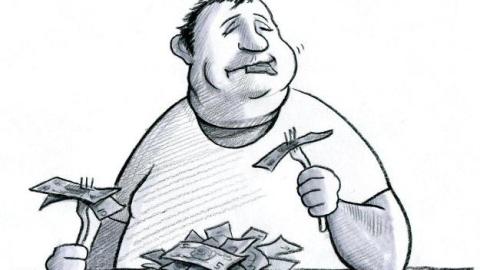How Much of Anything Is Enough?

Do you have enough enoughness in your life? Your biology definitely does. But your unevolved economic appetites might not. Life is limited—as are all bodily appetites. Limitless errors feed on imagining otherwise (including a version of the “banality of evil”).
1. What if our appetite for money was like that for food? Some is vital. More is desirable… but only up to some point. Stomachs have limits, they send satiety signals when full. A mental override is needed to eat more (repeated enough = unhealthy).
2. Is money more like calories than integers? That money comes in integer amounts can feed the illusion that its increments are worth the same (a dollars a dollar). But the benefit or utility of calories varies (becomes diminishing, and ultimately toxic).
3. Since the idea of “diminishing marginal utility” doesn’t diminish corporate desire for unlimited growth, perhaps we need to recognize “toxic utility.” Money might be like food or temperature or oxygen in having a survival-compatible operating range, too little or too much kills.
4. Financial self-interest has become an easy, but poor and error-prone, proxy for the rich set of traits we evolved for survival. Seeing humans as individualists driven mainly by money, discounts our social and self-deficient nature (= WEIRD sampling error: Western, Educated, Industrialized, Rich, Democratic).
5. Money-hunger can’t be innate. It’s too recent an invention in evolutionary terms, and “the logic of the market remains cognitively unnatural” (Pinker).
6. Perhaps money-hunger most resembles our evolved status-seeking? But cultures that don’t channel status seeking to be collectively useful, risk not surviving. That’s likely why all surviving hunter-gatherer cultures limit group-threatening behaviors, especially from those with high status.
7. Perhaps beliefs about money, like those about food, are culturally configurable. Cultures that promote addictions ( = appetites “past reason hunted”) = unhealthy.
8. Some believe “greed is good” in markets. But under-guided markets can create waste (40% of food = unused), promote imprudent consumption, and counterproductive competition.
9. “Free markets” have unintelligently evolved a diffuse but still dangerous form of Arendt’s “banality of evil.” Decent people seeking only their livelihoods, intending no harm, work an institutional machinery that creates harms (like pollution).
10. To encourage unlimited money-hunger (individual or corporate) is to misuse the most powerful social forces on earth. Markets drive the activities of billions of people toward amazing ends. But their power is safer when intelligently guided, rather than left to mindlessly evolve by local incentives and chance.
Nature (and our nature) is limit-full. If we define “limitism” as organizing ourselves to accommodate known limits, we can see that limitlessness involves ignorance. Knowledge of reality demands limitism.
Illustration by Julia Suits, The New Yorker cartoonist & author of The Extraordinary Catalog of Peculiar Inventions




